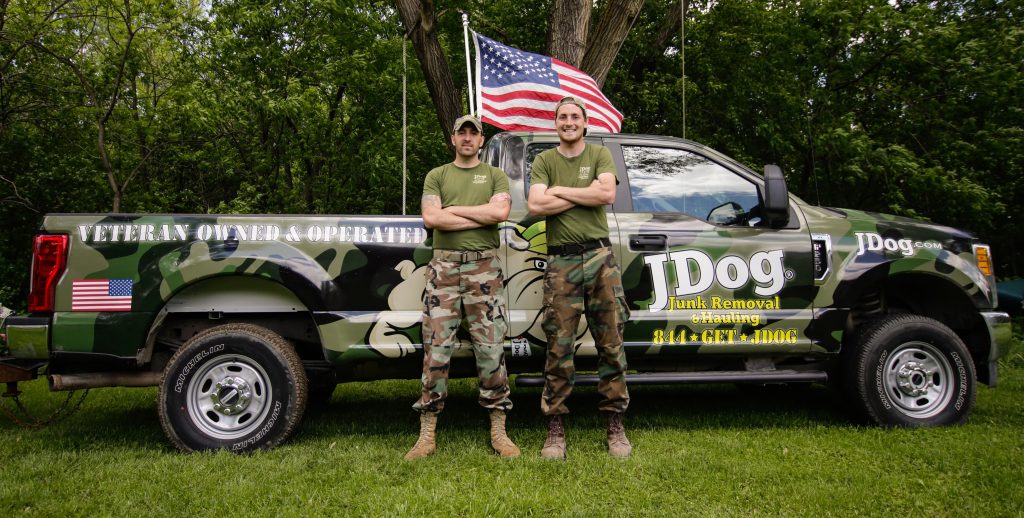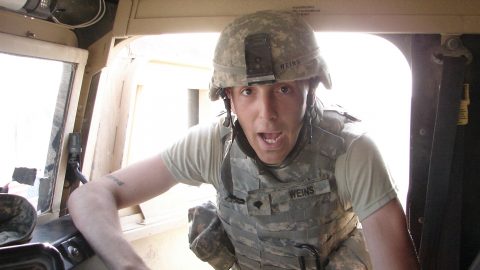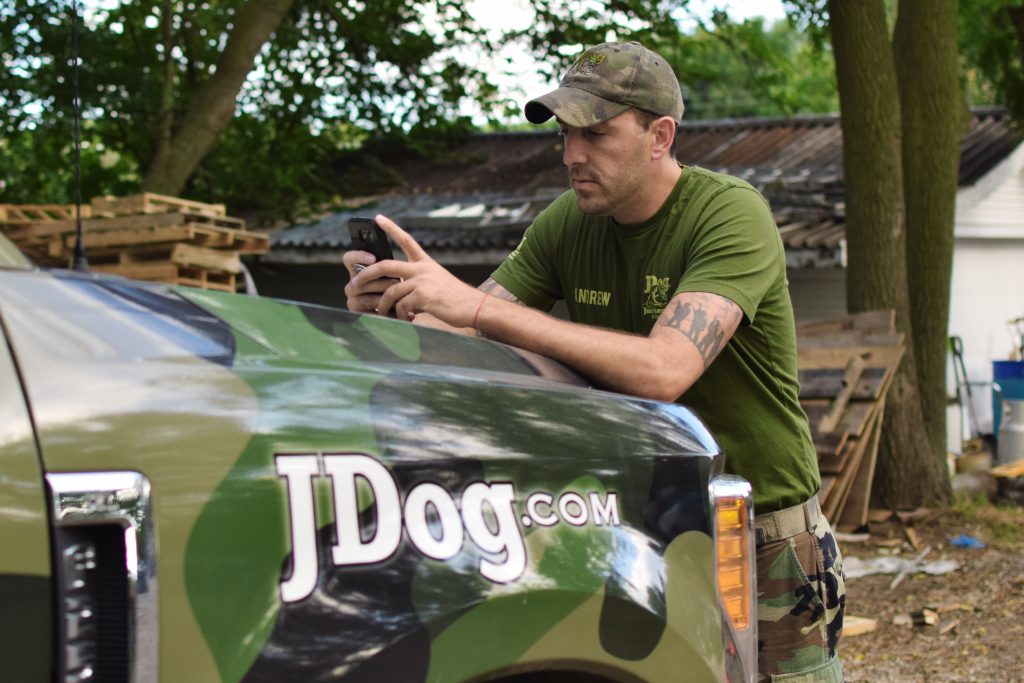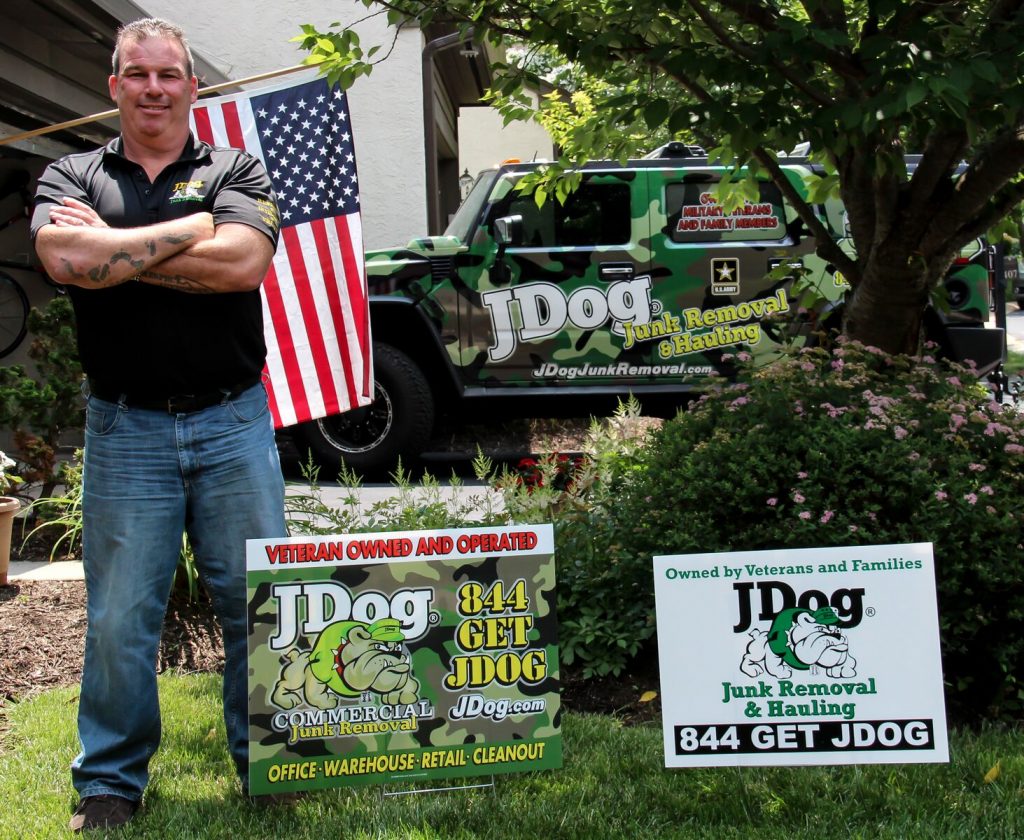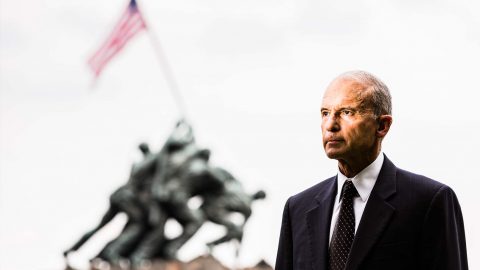Mission ready: JDog helps veterans take a bite out of business ownership
The operation: remove a bulky restaurant oven from a cramped kitchen. Do it safely and swiftly, with military precision. Andrew Weins led the extraction. The plan was his.
First, two camo-wearing men slid pry bars beneath the giant steel box and wrenched it from the wall. Next, two others grabbed the oven with ropes and gently lowered it onto a dolly. Finally, the team rolled the piece outside and onto a trailer adorned with an American flag then headed to the scrap yard.
Mission complete. No sweat, no drama, as they were trained. Two of the men on the detail were U.S. military veterans and two more were military family members. Weins, himself, served one year in Iraq, hauling fuel through Al Anbar Province as his convoy came under attack more than 25 times from roadside bombs and gunfire. Now he hauls away clutter.
“There’s a military saying we have that works for everything we do now: Slow is smooth, smooth is fast, fast is good. That’s how we do everything,” Weins says. “That works whether you’re pulling a trigger or pulling an oven out of a kitchen.”
Weins is one of more than 300 U.S. veterans and veteran family members working across 35 states under the banner of JDog Junk Removal & Hauling, an American franchiser that provides veterans (and only veterans and their relatives) the opportunity to own and manage their own business.
The tight world of self-described “JDogs” – bound by shared experiences, military values and an active Facebook page – was launched six years ago by Jerry Flanagan, a U.S. Army veteran driven to slash veteran unemployment and infuse those returning from war with a sense of family and purpose.
“I’m finding what’s even more valuable than the money they’re making is that ethos of brotherhood,” says Flanagan, who operates JDog from Berwyn, Pennsylvania, near Philadelphia.
“There’s a whole community of military veterans out there who are not looking for a handout; they just want a real opportunity to own a business and to be productive in society and hire other veterans. We’re just scratching the surface,” Flanagan says. “We’re putting veterans into small business ownership.”
To date, Flanagan has awarded veterans and military families 251 JDog territories. Each designated market consists of about 200,000 people plus all of the businesses, churches, colleges and military bases within those boundaries. Among franchise owners, 40 percent served in combat and 90 percent have a military-related disability, most commonly hearing loss, Flanagan says.
The entry fee for a JDog franchise ranges from $75,000 to $100,000. (In junk removal, franchise fees typically run about $250,000, Flanagan says.) For their investment, veterans receive a training course, marketing and public relations expertise, a webpage, a toll-free number offering job leads, strategic partnerships with companies like Right Aid, a branded camouflage wrapper for their trucks, and more.
“We teach you how to run the business model effectively,” Flanagan says. “All of our JDogs use Microsoft 365 – especially SharePoint – every day on our cell phones. That’s how we share information.”
Microsoft 365 brings together Office 365, Windows 10 and Enterprise Mobility + Security, delivering a complete, intelligent and secure solution to empower employees. The solution is crucial to growing a network of franchises that operate, communicate and schedule work on the fly, Flanagan says.
“We don’t have retail locations. We work out of our trucks and at our kitchen tables,” Flanagan says. “They’re all on the road, working from their mobile devices all day to book jobs. So Microsoft 365 is a very mobile, very simple, very effective way of doing business.”
Weins is typical of many of the men and women in the JDog family.
The U.S. Army reservist from Menomonee Falls, Wisconsin deployed to Iraq in April 2006.
Based 45 miles west of Baghdad at Al-Taquaddum Air Base, or “Camp TQ,” he spent the next 12 months driving a fuel truck.
His 93 combat missions covered 40,000 miles on roads often laced with improvised explosive devices, or IEDs.
“The convoy saw upwards of 25 IED attacks plus small arms fire, what we call ‘danger close,’” says Weins, who speaks quickly, with ferocity and confidence.
“On October 23rd, 2006, my truck was blown up. I was able to walk away from it. I guess that was good.
“But I went over there as a 21-year-old kid and came back as a 23-year-old grown man. I came back angry at the world. Turns out I have PTSD.”
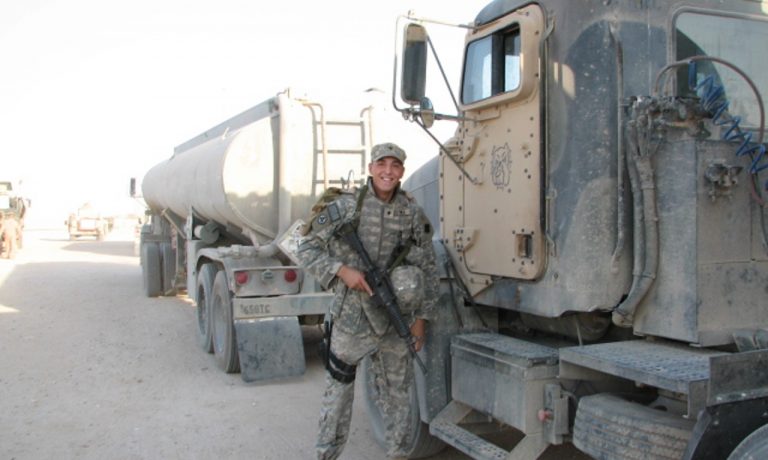
His former Wisconsin employer, a power tool company, had held Weins’ job for him.
But soon after his June 2007 homecoming, Weins recognized that he didn’t fit in that environment any longer – and the environment didn’t fit him.
Ninety days later, he was out of work.
“I changed, my job changed and my boss changed. It wasn’t good anymore. We didn’t see eye to eye.”
He remained jobless for the nine months, then a common hardship among veterans his age. In 2011, the unemployment rate among U.S. veterans aged 18-24 increased to nearly 30 percent, according to the Rand Corporation.
In 2009, out of money and still unable to gain employment, Weins started his own scrapping and junk-hauling business. Turned out, he liked the muscular labor as well as keeping the books, meeting clients and performing a daily task he knew well – driving a truck. In 2016, he got a loan from his parents and bought a JDog franchise.
“I wanted to join a winning team, a winning team that has a mission,” Weins said.
He started his JDog franchise with one truck, one trailer and one part-time employee. Fifteen months later, he has 13 full-time employees, five trucks, seven trailers – “and zero cares,” he says.
“Everything we do is on smartphones or tablets. I don’t do anything on paper. I watch my efficiencies. I know where my guys are. I know what my costs of goods are,” Weins says.
In 2011, the year Flanagan launched JDog, the unemployment rate among U.S. veterans who served after the Sept. 11 attacks reached 15.2 percent, compared to 9.6 percent among nonveterans.
According to statistics released this past August by the U.S. Bureau of Labor Statistics, the unemployment rate among post-Sept.-11 veterans was 4.2 percent, compared to 4.4 percent among nonveterans.
“We believe we’re leading the charge to get the unemployment rate under 1 percent for veterans,” Flanagan says. “That’s my personal mission.”
Flanagan next hopes to partner with similar veteran-owned models such as painting or cleaning services, perhaps expanding to 30 or 40 business categories to create “something like an Angie’s List for veterans,” he says.
The military brand, which denotes dependability for many Americans, will help link JDog to more customers with messy garages or unwanted furniture, says Paul Rieckhoff, founder and CEO of Iraq and Afghanistan Veterans of America (IAVA), America’s first and largest organization for Iraq and Afghanistan veterans.
“People want to support vets. We’re a popular constituency and a popular community,” says Rieckhoff, who served in the Army Reserve, including almost one year in Iraq as an infantry rifle platoon leader.
“This seems like the perfect business to unleash the potential of veterans. Their branding is cool. The camo is cool. We celebrate their success and I think other companies could learn a lot from them,” Rieckhoff says. “We say it all the time: Veterans are not a charity, they’re an investment.”
The need for jobs among veterans continues rising. Each year, more than 200,000 veterans transition back into civilian life, says Chris Cortez, a retired Marine Corps major general and vice president of Military Affairs at Microsoft.
In the digital economy, tech offers a particularly attractive sector for ex-military members, Cortez says.
“Veterans are trained to quickly assess, analyze and fix a situation with the resources at hand while working with a diverse group of people as a team,” Cortez says. “We owe it to these men and women to provide opportunities that help them successfully transition from a military career into a long-term, meaningful career in the civilian sector.”
And with more than 500,000 IT jobs opening each year, Cortez says “it’s our duty” to encourage veterans to seek computer science and STEM careers as viable paths.
To that end, Microsoft established the Microsoft Software & Systems Academy (MSSA), a platinum standard IT career transition program to address the IT skills shortage – and one of the ways service members can ease the transition into civilian life, Cortez says. MSSA graduates are now employed at more than 220 Microsoft hiring partners, many of which are Fortune 500 companies, including Dell, Expedia, Accenture, the U.S. Department of Defense, Facebook and more.
“Veterans are exactly the type of talent any company looks for. Their work ethic, loyalty, teamwork, problem solving under pressure – and their sense of duty and commitment to a mission – are traits that companies look for in the people they recruit,” Cortez says.
“It’s about hiring great people,” he adds. “If you hire the right people, your company will thrive, and our country will be the best it can be.”
Image of Chris Cortez by Brian Smale. All other images courtesy of Andrew Weins, Jerry Flanagan and JDog. Top image: Andrew Weins, left, with franchise co-owner and brother Isaac Weins.

